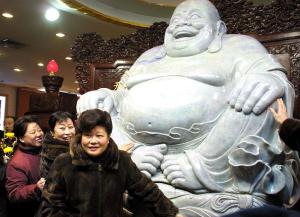 World faiths have long warned against overeating
World faiths have long warned against overeating
Christians may physically outweigh those of other faiths, but the problem of overeating has been around from ancient times, and most of the world’s religions warn against it.
Jewish law interprets the Torah to teach that we should take good care of our bodies. The noted 12th-century Jewish physician Maimonides observed that many physical disorders are related to overeating, and he interpreted Deuteronomy (21:20) as forbidding gluttony.
|
Note from the Editors: During the initial launch of Health Beat coverage, NCR will make these articles available for all Web site visitors. |
The prophet Mohammad’s recitation of God’s words in the Quran made it clear Muslims should be abstemious. It says: “Eat of the good things we have provided for your sustenance, but commit no excess therein, lest my wrath should justly descend on you, and those upon whom descends my wrath do perish indeed” (20:81).
University of Virginia anthropology professor Ravindra Khare said that Hinduism holds two opposing perspectives on overeating. He noted that the discipline of yoga highly prizes self-control, so much so that the ancient Hindu Laws of Manu prescribes counting the number of morsels put in one’s mouth. That same writing also states, “Excessive eating is prejudicial to health, to fame and to bliss in heaven; it prevents the acquisition of spiritual merit, and is odious among men.”
However, Khare said popular Hindu culture historically saw “plumpness” as a sign of prosperity. Until recent times, being overweight signified privilege and economic well-being. He also noted that speaking ill of one’s neighbors attracts bad Karma, so criticism of an individual’s weight is uncommon.
Vietnamese Zen Buddhist monk Thich Nhat Hanh has said, “Keeping your body healthy is an expression of gratitude to the whole cosmos -- the trees, the clouds, everything,” and he advises followers to be “aware of the suffering caused by unmindful consumption.”
 |
| Tourists pose for photos with
the seven-ton Laughing Buddha emerald statue in Shenyang,
China. -- AP |
Comparative religions professor Liz Wilson in Miami, Ohio, has written extensively on Buddhism and food. Regarding overeating, she cited two of the Buddha’s “Four Noble Truths.” The first Truth states that the world involves suffering (also interpreted as dissatisfaction or disease), “which is the kind of thing that sends a lot of Americans to the refrigerator” for comfort food, she said. The second truth says that suffering is caused by craving or excessive attachment -- “the false belief that your discomfort will be relieved by food, or sex, or alcohol or gossip,” according to Wilson. She said people are dissatisfied because we expect life’s experiences to be like food and fulfill us, “but the world is what it is, and we cannot be like the child at the mother’s breast, sometimes we are not comforted, sometimes we are hurt.”
Wilson also noted that the pudgy, happy Buddha often seen in Chinese restaurants is “apocalyptic” and specific to China. “From a social justice point of view, that Buddha is wonderful,” she said, because it symbolizes a time in the future when righteousness will prevail “and no one will be hungry -- we will all eat.” A thinner, world-renouncing Buddha is more common in other areas of the world.
Regarding attitudes toward overweight she has observed that “bookstore Buddhists,” those who are U.S.-born and have a common cultural idea of the perfect body, are often thin. Whereas, as in Hinduism, she said, “ethnic Buddhists often have their own definitions of the ideal body.” And for them, “generally speaking,” she said, “affluence is associated with a generous frame.”
-- Melissa Jones
National Catholic Reporter, March 5, 2004